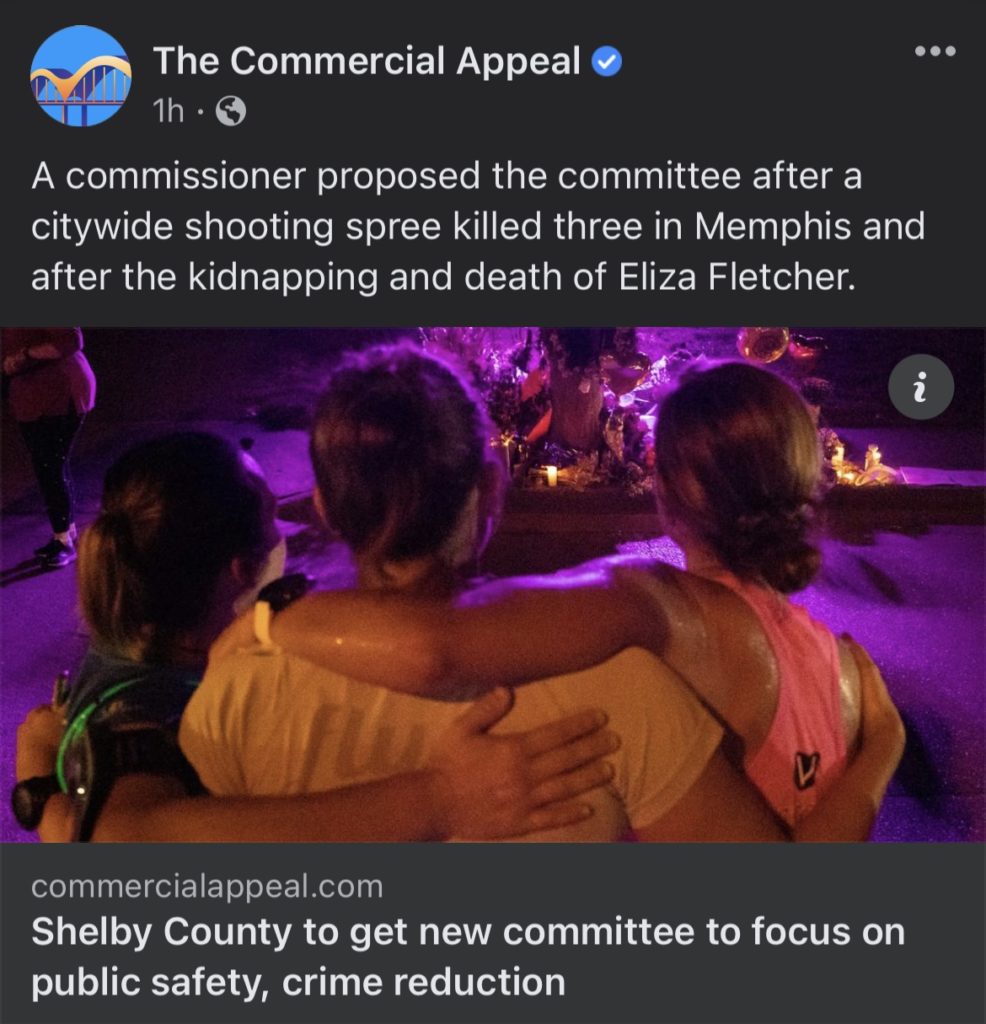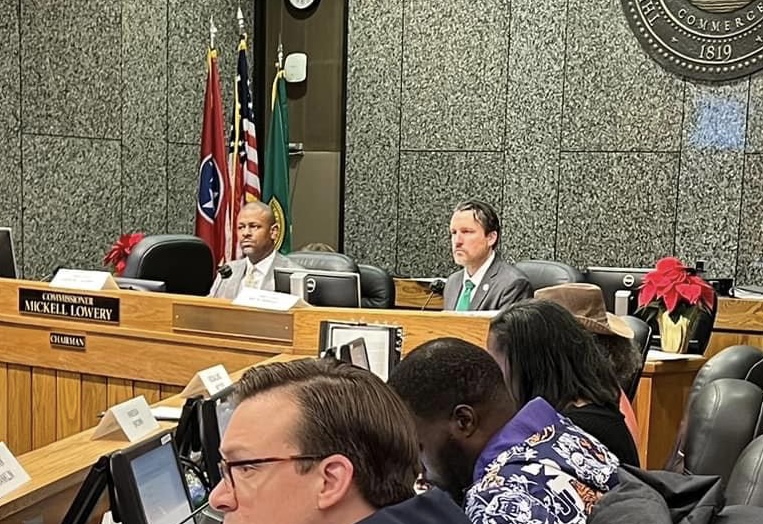The following update was originally posted to Facebook on September 18, 2022.
This week the Memphis City Council voted unanimously in favor of a resolution requesting help from the Shelby County Sheriff’s office and from the State Highway Patrol.
In committee, Memphis Police Department Chief C.J. Davis told council members the City of Memphis had 1,932 police officers, with a new class of 96 halfway through their training. That would leave the City about 500 officers below their goal of 2,500.
As of the last reported count, Shelby County had 72 vacant deputy sheriff positions, or 10% short of the full complement budgeted for the current fiscal year. There is also an intense and growing need for the county to hire additional corrections employees.
For the past few years, several members of the Shelby County Commission have joined me in addressing these public safety workforce needs.
What follows is a summary of these efforts and a few ideas about what more can be done to improve public safety.
Residency rule
Prior to recent legislative changes, all Shelby County employees were required to live within the county lines, including Sheriff’s deputies.
That started to change in early 2020, but it was a battle.
In January of that year, I introduced an ordnance that would have deleted all references to a residency requirement and calling for a referendum on the issue to be placed before voters in the August 2020 countywide general election. The ordinance would have expanded the Sheriff’s hiring pool, allowing him to recruit candidates living elsewhere. It would have been a blanket removal of the rule, applying equally to every county employee.
In committee, the proposed ordinance received yes votes from only 2 of 13 commissioners. Commissioner Amber Mills was the only member who joined me in support. The following Monday, the full commission rejected my sponsored ordinance by a vote of 3-4, with Commissioner Brandon Morrison joining Mills and me in favor.
On second reading in committee, the ordinance moved forward by a vote of 3-2, with only those same three commissioners supporting it.
In full commission on second reading, my ordinance was replaced with a substitute drafted by Mills and Commissioner Mark Billingsley. The substitute removed the language allowing a referendum, restricted its application to first responders only, and set an expiry date of April 2024. The substitute failed by a vote of 5-2.
On third reading in committee, Commissioner Mills moved to amend the substitute ordinance by introducing a $2,500 reduction in pay for employees living outside the county lines. Additional amendments were added by other commissioners, moving the expiration date up to 2022 and adding corrections officers to the positions being exempted. The amended substitute secured a 7-2 vote majority.
The following week it passed the full commission by a vote of 8-1.
This process took two months for us to accomplish but was ultimately not a very great asset to the Sheriff due to the $2,500 forfeiture and the 2-year sunset date.
This March, the legislation’s three original supporters (Wright, Mills and Morrison) came together again with a new ordinance that would have extended the residency exemption two additional years, to April 2024.
On first reading, the extension carried 10-1.
Before a second reading of the extension could be held, the Tennessee General Assembly passed a prohibition on residency requirements for law enforcement. The bill passed 75-17 in the House and 26-6 in the Senate and was signed into law by Governor Bill Lee on March 24, 2022.
However, the state’s legislation did not apply to corrections officers, so Commissioner Mills moved forward with a substitute ordinance that exempted those positions from the residency requirement but required them to forfeit $1,500 and expired in April 2024. This ordinance passed with a bare majority in third reading on May 9, 2022.
Defunding the Sheriff
In the months following us lifting the residency requirement for law enforcement, we were faced with both a global pandemic and a national movement to defund the police.
On June 9, 2020, there were two efforts to cut funding to the Sheriff’s office for FY21. The first budget amendment would have cut the Sheriff’s budget by 10% and failed by a vote of 4-7. Hours later, a similar amendment would have cut the Sheriff’s budget by 5% and narrowly failed by a vote of 5-5.
The following month, protesters vandalized the homes of Sheriff Floyd Bonner, Commissioner Amber Mills and Commissioner Mark Billingsley overnight. Also that month, a group of protesters burned ornamental lawn flags and launched fireworks at the home of District Attorney Amy Weirich.
Despite these efforts to intimidate us, we maintained our support for law enforcement.
Bonus pay
Although the pandemic and public health policy had thrown the county’s financial picture into turmoil, that next year the Commission directed a large portion of the county’s American Rescue Plan Act funding toward employee retention, approving a $5,000 bonus for every full-time worker, with the largest portion of those funds being directed toward the Sheriff’s office.
Stipends
In March of this year, Commissioners followed that bonus with another one-time $5,000 stipend for Shelby County Sheriff’s Office employees.
Salary increases
And this June, the Commission approved a historically-large 5% raise for all county employees, including those working in the Sheriff’s office.
Pubic Safety
Unfortunately, bonus money, stipends, salary increases and an expanded hiring pool have not been enough to solve the issue of violent crime in Shelby County.
There remains a need to further address the issues related to criminal behavior and community violence. The county has several new initiatives underway, but the county commission has not had a forum by which to study these issues in a unified, strategic way.

The public safety committee I have proposed will allow commissioners to better investigate and respond to aspects of this problem such as the rape kit backlog, the criminal court trial backlog, the juvenile court’s lack of a rigorous process for monitoring delinquent youth, and a host of other related issues that are typically considered in a disconnected and disjointed way by our county’s legislative body.
We need to act more swiftly, more strategically, and with better information.
Just as additional points of reference, over the past four years, to the best of my knowledge:
1. The county commission has not once received a violent crime briefing from the Sheriff’s office.
2. The county commission has not once welcomed the crime commission for a briefing, even to present its newly-released community safety plan.
3. The county commission has never received a briefing from the corrections department or the office of re-entry detailing the ways in which inmates are being connected to workforce opportunities or occupational and mental health professionals.
4. The county commission has never received a briefing from the Crime Victims and Rape Crisis Center about the wait times involved in testing rape kits.
5. The county commission has never attempted to fully map the ways in which delinquent youth may be routed between the Juvenile Court, the Juvenile Detention Center, the Community Services’ Family Resource Center, the Shelby County Schools Evening Reporting Center, the Health Department’s Cure Violence team, and/or other community partners.
These activities and many, many others can be initiated by a public safety committee, to better inform our legislative priorities and actions. That, in part, is why I’m pushing for its creation.

